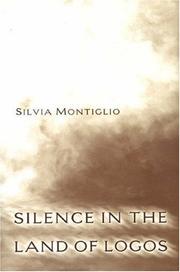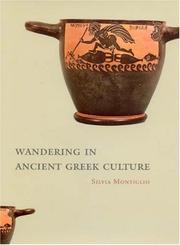| Listing 1 - 10 of 15 | << page >> |
Sort by
|
Book
ISBN: 9780472117741 9780472027507 0472027506 0472117742 1283282364 9781283282369 6613282367 9786613282361 Year: 2011 Publisher: Ann Arbor
Abstract | Keywords | Export | Availability | Bookmark
 Loading...
Loading...Choose an application
- Reference Manager
- EndNote
- RefWorks (Direct export to RefWorks)
Odysseus as a model of wisdom in Greek and Roman philosophy.
Odysseus (Greek mythology) in literature. --- Odyssée (Mythologie grecque) dans la littérature --- Homer. --- Odyssée (Mythologie grecque) dans la littérature --- Odysseus, --- Odaiséas, --- Odisej, --- Odiseja, --- Odisėjas, --- Odisejs, --- Odiseo, --- Odiseu, --- Odissea, --- Odisseas, --- Odisseu, --- Odisseus, --- Odissey, --- Odusseus, --- Odüsszeusz, --- Odyseusz, --- Odyssevs, --- Odyseus, --- Odysews, --- Ódysseifur, --- Oliseus, --- Olisseus, --- Oylixeus, --- Olytteus, --- Ulises, --- Ulisse, --- Ulissi, --- Ulixes, --- Ulysse, --- Ulysses, --- Utuze, --- Οδυσσέας, --- Ὀδυσσεύς, --- Ὀλισεύς, --- Ὀλισσεύς, --- Ὀλυττεύς, --- Οὐλιξεύς, --- אודיסאוס, --- オデュッセウス, --- 奥德修斯, --- 오디세우스, --- أوديسيوس, --- Адысей, --- Одисеј, --- Одисей, --- Одіссей, --- Одиссей, --- In literature.

ISBN: 0691004722 Year: 2000 Publisher: Princeton (N.J.): Princeton university press
Abstract | Keywords | Export | Availability | Bookmark
 Loading...
Loading...Choose an application
- Reference Manager
- EndNote
- RefWorks (Direct export to RefWorks)
Greek literature --- -Literature and anthropology --- -Literature and society --- -Silence --- Silence in literature --- Noise --- Literature --- Literature and sociology --- Society and literature --- Sociology and literature --- Sociolinguistics --- Anthropology and literature --- Anthropology --- Balkan literature --- Byzantine literature --- Classical literature --- Classical philology --- Greek philology --- History and criticism --- Social aspects --- Greece --- -Civilization --- Literature and anthropology --- Literature and society --- Silence in literature. --- Silence. --- History and criticism. --- Silence --- Civilization.
Book
ISBN: 0199916055 0199916047 0199980233 9780199916054 9780199980239 9780199916047 Year: 2013 Publisher: New York Oxford University Press
Abstract | Keywords | Export | Availability | Bookmark
 Loading...
Loading...Choose an application
- Reference Manager
- EndNote
- RefWorks (Direct export to RefWorks)
The core of this book is an investigation of the treatment of the recognition motif in the Greek novels. It also includes forays into the Roman novels, early Jewish and Christian narratives, and an overview of a sample of early modern European texts, which have been influenced by the ancient novel in their recognition scenes.
Greek fiction --- Latin fiction --- Recognition in literature. --- History and criticism.

ISBN: 1282767143 9786612767142 1400823765 1400812747 9781400812745 9781400823765 9780691004723 0691004722 9780691146584 0691146586 140080552X 1400805538 9781400805532 9781282767140 Year: 2000 Publisher: Princeton, N.J.
Abstract | Keywords | Export | Availability | Bookmark
 Loading...
Loading...Choose an application
- Reference Manager
- EndNote
- RefWorks (Direct export to RefWorks)
In ancient Greece, the spoken word connoted power, whether in the free speech accorded to citizens or in the voice of the poet, whose song was thought to know no earthly bounds. But how did silence fit into the mental framework of a society that valued speech so highly? Here Silvia Montiglio provides the first comprehensive investigation into silence as a distinctive and meaningful phenomenon in archaic and classical Greece. Arguing that the notion of silence is not a universal given but is rather situated in a complex network of associations and values, Montiglio seeks to establish general principles for understanding silence through analyses of cultural practices, including religion, literature, and law. Unlike the silence of a Christian before an ineffable God, which signifies the uselessness of words, silence in Greek religion paradoxically expresses the power of logos--for example, during prayer and sacrifice, it serves as a shield against words that could offend the gods. Montiglio goes on to explore silence in the world of the epic hero, where words are equated with action and their absence signals paralysis or tension in power relationships. Her other examples include oratory, a practice in which citizens must balance their words with silence in very complex ways in order to show that they do not abuse their right to speak. Inquiries into lyric poetry, drama, medical writings, and historiography round out this unprecedented study, revealing silence as a force in its own right.
Book
ISBN: 0755624475 0857739832 0857726595 9780857726599 9781784533519 1784533513 1350197432 9780755624478 9780857739834 Year: 2016 Publisher: London ; New York : I.B. Tauris,
Abstract | Keywords | Export | Availability | Bookmark
 Loading...
Loading...Choose an application
- Reference Manager
- EndNote
- RefWorks (Direct export to RefWorks)
Sleep was viewed as a boon by the ancient Greeks: sweet, soft, honeyed, balmy, care-loosening, as the Iliad has it. But neither was sleep straightforward, nor safe. It could be interrupted, often by a dream. It could be the site of dramatic intervention by a god or goddess. It might mark the transition in a narrative relationship, as when Penelope for the first time in weeks slumbers happily through Odysseus' vengeful slaughter of her suitors. Silvia Montiglio's imaginative and comprehensive study of the topic illuminates the various ways writers in antiquity used sleep to deal with major aspects of plot and character development. The author shows that sleeplessness, too, carries great weight in classical literature. Doom hangs by a thread as Agamemnon - in Iphigenia in Aulis - paces, restless and sleepless, while around him everyone else dozes on. Exploring recurring tropes of somnolence and wakefulness in the Iliad, the Odyssey, Athenian drama, the Argonautica and ancient novels by Xenophon, Chariton, Heliodorus and Achilles Tatius, this is a unique contribution to better understandings of ancient Greek writing.
Digital
ISBN: 9781400823765 9780691146584 Year: 2010 Publisher: Princeton, N.J. Princeton University Press
Abstract | Keywords | Export | Availability | Bookmark
 Loading...
Loading...Choose an application
- Reference Manager
- EndNote
- RefWorks (Direct export to RefWorks)
Book
ISBN: 9781784539566 1784539562 9781786722904 9781786732903 1350988944 1786722909 1786732904 9781350988941 Year: 2017 Publisher: London, England : London, England : I.B. Tauris & Co. Ltd, Bloomsbury Publishing,
Abstract | Keywords | Export | Availability | Bookmark
 Loading...
Loading...Choose an application
- Reference Manager
- EndNote
- RefWorks (Direct export to RefWorks)
"Hero and Leander are the protagonists in a classical tale of epic but tragic love. Hero lives secluded in a tower on the European shore of the Hellespont, and Leander on the opposite side of the passage. Since they cannot hope to marry, the couple resolves to meet in secret: each night he swims across to her, guided by the light of her torch. But the time comes when a winter storm kills both the light and Leander. At dawn, Hero sees her lover's mangled body washed ashore, and so hurls herself from the tower to meet him in death. Silvia Montiglio here shows how and why this affecting story has proved to be one of the most popular and perennial mythologies in the history of the West. Discussing its singular drama, danger, pathos and eroticism, the author explores the origin of the legend and its rich and varied afterlives. She shows how it was used by Greek and Latin writers; how it developed in the Middle Ages - notably in the writings of Christine de Pizan - and Renaissance; how it inspired Byron to swim the Dardanelles; and how it has lived on in representations by artists including Rubens and Frederic Leighton."--
Hero (Greek mythology) --- Leander (Greek mythology) --- Hero and Leander --- Leander --- Hero --- Civilization, Modern --- Mythology, Greek --- Greek influences. --- Influence. --- Hero, --- Leander, --- Hero (Greek mythological character) --- Leander (Greek mythological character) --- Heroes --- History. --- Mythology.
Book
ISBN: 9780815353249 0815353243 Year: 2020 Publisher: London : Routledge,
Abstract | Keywords | Export | Availability | Bookmark
 Loading...
Loading...Choose an application
- Reference Manager
- EndNote
- RefWorks (Direct export to RefWorks)
"This book offers a new English translation of Musaeus' poem Hero and Leander, with the original Greek on the facing page, a substantial introduction and a detailed commentary. The tragic romance of Hero and Leander has had and still has a great appeal, inspiring countless writers, painters, sculptors, musicians. The introduction aims at situating the poem within its literary tradition and cultural context as well as at drawing its major themes and describing the salient features of its style. Because Hero and Leander enjoyed an immense and uninterrupted popularity, the introduction also devotes a large section to the poem's reception in literature, which crosses paths with the reception of the other main ancient poetic treatment of the legend, Ovid's Heroides 18 and 19. The commentary, which follows the Greek text and its translation, is addressed to a variety of readers: the student and the scholar of Greek literature, as well as those of other literatures in which the poem has been inspirational. This work has no precedent in the English language. This new translation will be of interest to students and scholars of Greek and Late Antique literature, as well as those working on mythology and classical reception"--
Book
ISBN: 9780199916047 Year: 2013 Publisher: Oxford [etc.] Oxford University Press
Abstract | Keywords | Export | Availability | Bookmark
 Loading...
Loading...Choose an application
- Reference Manager
- EndNote
- RefWorks (Direct export to RefWorks)
Recognition in literature. --- Greek fiction --- Latin fiction --- History and criticism. --- Recognition in literature --- History and criticism

ISBN: 0226534979 9780226534978 Year: 2005
Abstract | Keywords | Export | Availability | Bookmark
 Loading...
Loading...Choose an application
- Reference Manager
- EndNote
- RefWorks (Direct export to RefWorks)
"From the Archaic period to the Greco-Roman age, the figure of the wanderer held great significance in ancient Greece. In the first comprehensive study devoted to this theme, Wandering in Ancient Greek Culture unearths the many meanings attached to this practice over the centuries. Employing a broad range of literary and philosophical texts, Silvia Montiglio demonstrates how wandering has been conceptualized from Homer's Odysseus - the hero "who wandered much"--In the eighth century B.C.E. to pagan sages of the early Roman Empire." "Examining the act of wandering through many lenses, Wandering in Ancient Greek Culture addresses questions such as: Why did the Greeks associate the figure of the wanderer with the condition of exile? How was the expansion of the world under Rome reflected in the connotations of wandering? Does a person learn by wandering, or is wandering a deviation from the truth? In the end, this matchless volume shows how the transformations that affected the figure of the wanderer coincided with new perceptions of the world and of travel, and invites us to consider its definition and import today."--Jacket.
Nomads in literature --- Reis in de literatuur --- Reizen in de literatuur --- Travel in literature --- Voyage dans la littérature --- Voyages dans la littérature --- Civilization. --- Drifters --- Drifters. --- Greek literature --- Greek literature. --- Griechisch. --- Griekse oudheid. --- Literatur. --- Littérature grecque --- Nichtsesshaftigkeit. --- Nomades dans la littérature. --- Nomads in literature. --- Reizen. --- Rondtrekkenden. --- Travel in literature. --- Travelers in literature. --- Travelers --- Travelers. --- Vagabonds --- Voyage dans la littérature. --- Voyageurs dans la littérature. --- Voyageurs --- History --- History and criticism. --- Histoire et critique. --- Histoire --- Geschichte. --- To 1500. --- Greece --- Greece. --- Grèce --- Civilization --- Civilisation --- Travelers in literature --- Voyages and travels in literature --- Travellers --- Voyagers --- Wayfarers --- Persons --- Voyages and travels --- Rogues and vagabonds --- History and criticism --- To 1500 --- To 146 B.C.
| Listing 1 - 10 of 15 | << page >> |
Sort by
|

 Search
Search Feedback
Feedback About UniCat
About UniCat  Help
Help News
News